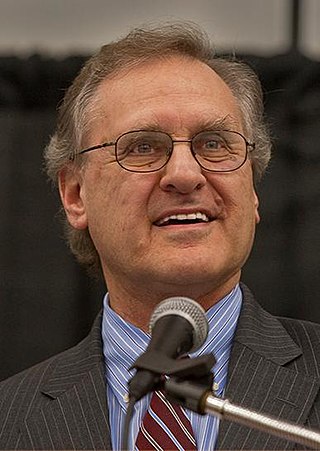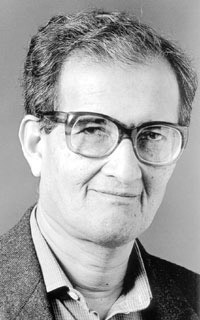Social contract is a broad class of theories that try to explain the ways in which people form states and/or maintain social order.
Contents
Social Contract may also refer to:
Social contract is a broad class of theories that try to explain the ways in which people form states and/or maintain social order.
Social Contract may also refer to:

Bruce Perens is an American computer programmer and advocate in the free software movement. He created The Open Source Definition and published the first formal announcement and manifesto of open source. He co-founded the Open Source Initiative (OSI) with Eric S. Raymond.

Debian, also known as Debian GNU/Linux, is a Linux distribution composed of free and open-source software, developed by the community-supported Debian Project, which was established by Ian Murdock on August 16, 1993. The first version of Debian (0.01) was released on September 15, 1993, and its first stable version (1.1) was released on June 17, 1996. The Debian Stable branch is the most popular edition for personal computers and servers. Debian is also the basis for many other distributions, most notably Ubuntu.
Network, networking and networked may refer to:

In moral and political philosophy, the social contract is a theory or model that originated during the Age of Enlightenment and usually, although not always, concerns the legitimacy of the authority of the state over the individual.
The Labour Party is a social-democratic political party in the Netherlands.
MP, Mp, mp or .mp may refer to:

British Guiana was a British colony, part of the mainland British West Indies, which resides on the northern coast of South America. Since 1966 it has been known as the independent nation of Guyana.
Social credit is a distributive philosophy of political economy developed by C. H. Douglas. Douglas attributed economic downturns to discrepancies between the cost of goods and the compensation of the workers who made them. To combat what he saw as a chronic deficiency of purchasing power in the economy, Douglas prescribed government intervention in the form of the issuance of debt-free money directly to consumers or producers in order to combat such discrepancy.

The Canadian social credit movement is a political movement originally based on the Social Credit theory of Major C. H. Douglas. Its supporters were colloquially known as Socreds in English and créditistes in French. It gained popularity and its own political party in the 1930s, as a result of the Great Depression.

Educational Testing Service (ETS), founded in 1947, is the world's largest private nonprofit educational testing and assessment organization. It is headquartered in Lawrence Township, New Jersey, but has a Princeton address.

Stephen Henry Lewis is a Canadian politician, public speaker, broadcaster, and diplomat. He was the leader of the social democratic Ontario New Democratic Party for most of the 1970s.

The Social Credit Party of Canada, colloquially known as the Socreds, was a populist political party in Canada that promoted social credit theories of monetary reform. It was the federal wing of the Canadian social credit movement.
The Debian Free Software Guidelines (DFSG) is a set of guidelines that the Debian Project uses to determine whether a software license is a free software license, which in turn is used to determine whether a piece of software can be included in Debian. The DFSG is part of the Debian Social Contract.
Historically in Quebec, Canada, there were a number of political parties that were part of the Canadian social credit movement. There were various parties at different times with different names at the provincial level, all broadly following the social credit philosophy; at various times they had varying degrees of affiliation with the Social Credit Party of Canada at the federal level.
Stuart Kingsley Holland is a British economist and former politician.

The liberal paradox, also Sen paradox or Sen's paradox, is a logical paradox proposed by Amartya Sen which shows that no means of aggregating individual preferences into a single, social choice, can simultaneously fulfill the following, seemingly mild conditions:

Mei Li Vos is a Dutch politician, former trade unionist and editorialist. A member of the Labour Party (PvdA), she was a member of the House of Representatives from 1 March 2007 to 17 June 2010 and again from 20 September 2012 until 23 March 2017. She has been a member of the Senate since 11 June 2019, serving as parliamentary leader of the PvdA group until 2023, and First Vice-President of the Senate since then.
A relational contract is a contract whose effect is based upon a relationship of trust between the parties. The explicit terms of the contract are an outline implicit terms and understandings that determine the behaviour of the parties.
The New Left was a broad political movement mainly in the 1960s and 1970s. It consisted of activists in the Western world who campaigned for a broad range of social issues such as civil and political rights, feminism, gay rights, rejection of gender roles, and drug policy reforms. Some see the New Left as an oppositional reaction to earlier Marxist and labor union movements for social justice that focused on dialectical materialism and social class, while others who used the term see the movement as a continuation and revitalization of traditional leftist goals.

Herbert Marcuse was a German-American philosopher, social critic, and political theorist, associated with the Frankfurt School of critical theory. Born in Berlin, Marcuse studied at the Humboldt University of Berlin and then at Freiburg, where he received his PhD. He was a prominent figure in the Frankfurt-based Institute for Social Research – what later became known as the Frankfurt School. He was married to Sophie Wertheim (1924–1951), Inge Neumann (1955–1973), and Erica Sherover (1976–1979). In his written works, he criticized capitalism, modern technology, Soviet Communism, and popular culture, arguing that they represent new forms of social control.